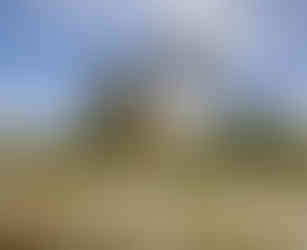Mansion of Mazra‘ih - a Baha'i Holy Place
- Uplifting Words

- Jan 3, 2019
- 6 min read
Updated: Jan 16, 2019

In such esteem was Bahá’u’lláh held after many years of imprisonment in Akka that the local officials said that He was free to leave the prison city. To test this, in late spring 1877 ‘Abdu’l-Bahá obtained permission from the owners of a pine grove near the Mansion of Bahjí outside ‘Akká to host a banquet for the notables of the city. When they accepted ‘Abdu’l-Bahá's hospitality, it was clear that the order to keep Bahá’u’lláh within the prison city, although never formally revoked, would no longer be enforced.
After the banquet held by ‘Abdu’l-Bahá near Bahjí, the governor of ‘Akká confirmed that Bahá’u’lláh was free to live outside the walled city. Although He was at first reluctant to avail Himself of this permission, He eventually was persuaded to leave the city for the Mansion of Mazra‘ih.
`Abdu’l-Bahá recounts, as quoted by John Esselmont in Baha'u'llah and the New Era:
"One day I went to the Holy Presence of the Blessed Beauty and said: “the palace at Mazra’ih is ready for You, and a carriage to drive You there.” (At that time there were no carriages in Akka or Haifa.) He refused to go, saying: “I am a prisoner.” Later I requested Him again, but got the same answer. I went so far as to ask Him a third time, but He still said “No!” and I did not dare to insist further. There was, however, in Akka a certain Muhammadan Shaykh, a well-known man with considerable influence, who loved Bahá’u’lláh and was greatly favored by Him. I called this Shaykh and explained the position to him. I said, “You are daring. Go tonight to His Holy Presence, fall on your knees before Him, take hold of His hands and do not let go until He promises to leave the city!” He was an Arab. … He went directly to Baha’u’llah and sat down close to His knees. He took hold of the hands of the Blessed Beauty and kissed them and asked: “Why do you not leave the city?” He said: “I am a prisoner.” The Shaykh replied: “God forbid! Who has the power to make you a prisoner? You have kept yourself in prison. It was your own will to be imprisoned, and now I beg you to come out and go to the palace. It is beautiful and verdant. The trees are lovely, and the oranges like balls of fire!” As often as the Blessed Beauty said: “I am a prisoner, it cannot be,” the Shaykh took His hands and kissed them. For a whole hour he kept on pleading. At last Bahá’u’lláh said, “Khayli khub (very good)” and the Shaykh’s patience and persistence were rewarded. He came to me with great joy to give the glad news of His Holiness’s consent. In spite of the strict firman of Abdu’l-‘Aziz which prohibited my meeting or having any intercourse with the Blessed Perfection, I took the carriage the next day and drove with Him to the palace. No one made any objection. I left Him there and returned myself to the city. For two years He remained in that charming and lovely spot. "
Bahá’u’lláh departed the prison city in 1877 after nine years of continuous incarceration within the city walls.
‘Abdu’l-Bahá managed to rent a house called Mazra‘ih about six kilometers north of ‘Akká, and it was to this residence that Bahá’u’lláh moved when He finally departed the walled prison city in early June 1877. He was to live two years in the house.
Again, John Esselmont in his book, Baha'u'llah and the New Era, recounts 'Abdu'l-Baha himself describing this period:
"Baha'u'llah loved the beauty and verdure of the country. One day He passed the remark: "I have not gazed on verdure for nine years. The country is the world of the soul, the city is the world of bodies." When I heard indirectly of this saying I realized that He was longing for the country, and I was sure that whatever I could do towards the carrying out of His wish would be successful. There was in Akka at that time a man called Muhammad Pasha Safwat, who was very much opposed to us. He had a palace called Mazra'ih, about four miles north of the city, a lovely place, surrounded by gardens and with a stream of running water....I got the house at a very low rent, about five pounds per annum, paid him for five years and made a contract. I sent labourers to repair the place and put the garden in order and had a bath built. I also had a carriage prepared for the use of the Blessed Beauty."
After years of strict confinement in the city of ‘Akká, Bahá’u’lláh found great enjoyment at Mazra‘ih. In one tablet He describes in cheerful language the view of the sea on one side and the hills of Galilee on the other, and speaks of the charm of the trees laden with oranges that He likens to balls of fire.
The house itself was a stone building of simple design, set in gardens. The best view was eastward to the Galilee hills.
Bahá’u’lláh lived in the house with members of His family and His amanuensis. ‘Abdu’l-Bahá and his sister, Bahíyyih Khánum, stayed back in the walled city of ‘Akká but visited frequently.
The freedom of living at Mazra‘ih allowed Bahá’u’lláh to meet pilgrims who came to see Him from throughout the Ottoman Empire and beyond.
During His time at the Mansion of Mazra‘ih, Bahá’u’lláh wrote many tablets to individuals which were delivered by trusted Bahá'ís.
Bahá’u’lláh's room on the second floor on the Mansion of Mazra‘ih had views of the sea and hills.
In the summer of 1879, there occurred one of those natural disasters for which Akka was the frequent host, an epidemic of plague erupted. As was their wont, those who could do so wisely fled from the centre of the epidemic, included among those who abandoned the city and its environs were Udi Khammar and his family. `Abdu’l-Bahá relates its consequences for Baha’u’llah:
It so happened that an epidemic disease had broken out at Bahjí, and the proprietor of the house fled away in distress, with all his family, ready to offer the house free of charge to any applicant. We took the house at a very low rent, and there the doors of majesty and true sovereignty were flung wide open.
Adib Taherzadeh in his book The Revelation of Baha’u’llah wrote:
"In order to appreciate the significance of Baha’u’llah’s move to Mazra’ih, and why it opened up a new chapter in the annals of the Faith, we may recall the tumultuous years of His Ministry preceding this historic step. As we survey Bahá’u’lláh’s eventful life at this juncture, we note that for over a quarter of a century He was the main target of attack by a relentless enemy. Prior to the birth of His own Revelation, He suffered greatly through persecutions directed at the Báb community. The appalling bastinado, which was inflicted upon Him in public in His native province of Mazindaran, is one example. The humiliating circumstances in which He was conducted on foot and in chains with bare feet and bared head in the heat of the summer to the Siyah-Chal of Tihran, His imprisonment in that darksome underground dungeon; the chain of Qara-Guhar which was placed on His neck and which cut through His flesh and left its marks on Him all His life; the hardships He endured during His first exile from His native country to Iraq; the deprivations and sufferings during His solitary retirement in the snow-bound mountains of Kurdistan; His further exile to the capital city of the Ottoman Empire, a city described by Him as the ‘seat of tyranny’; His humiliating banishment to Adrianople, the ‘remote Prison’, travelling in horse-driven carts in sub-zero temperatures; the sufferings He endured in that ‘Land of Mystery’; the hardships He was exposed to and the restrictions He underwent on His exile to the desolate city of Akka; the unbearable conditions of His solitary cell in the barracks of that city, designated by Him as the ‘Most Great Prison’; and His confinement for almost seven years within the walls of a small house devoid of any greenery to please the eye — all these tribulations which He, the Wronged One of the world, had endured with such resignation and forbearance, were at long last coming to an end. His departure from the prison-city signalized the opening of a new era of relative peace and tranquility in His life. It was not only the fresh air of the countryside at Mazra’ih and the open fields around it which enhanced the circumstances in which He lived. The major factor which brought about a new phase in His ministry was the unveiling of His greatness, His power and His authority to friends and foe alike. This was made manifest when the highest religious leader in the land knelt before Him in a state of humble adoration and begged Him to leave the prison-city, a move which the Governor of Akka, notwithstanding the strict edict of the Sultan, had approved."


































































